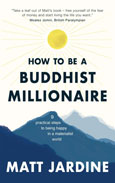
 |
How to be a Buddhist Millionaire: 9 practical steps to being happy in a materialist world
by Matt Jardine
Short Books
Jardine decided to undertake the 88 Temple Pilgrimage, which is a 1,400 km walk to visit eighty-eight Buddhist temples in Japan. The journey inspired him to write his first book, The Hardest Path. Later, Jardine realized that the lessons he learned on that pilgrimage could be applied very well to something as mundane as money. This idea led to the writing of the current book. This work is divided into three parts. The first talks about money and its value. The second covers finding one's own meaningful work. Finally, the third part covers the lessons he has found to help a person become a Buddhist Millionaire.
The quote opening this review is an appropriate one in that it helps describe the goal of this book. Jardine is not attempting to make a person a Buddhist or a millionaire. Rather, he desires to help readers decide on work that has real value to them. Doing so can help change a life, enabling one to pursue that work and find financial success and personal fulfillment in the process. The writing is clear and generally concise. The author does a great job of supporting his ideas with stories not only from his own life but also from the lives of many diverse people he has interviewed. The interviews are insightful and are well-positioned to help strengthen his points. In addition, Jardine's text offers many interesting quotes from people ranging from psychologists to athletes and pop stars. The well-rounded selection of interviews and quotes provides more insight and backbone to his ideas.
Self-help books are abundant in today's book world, and many of them seem either fluffy or regimented. They can be full of tired cliches or abstract, impractical advice. Jardine acknowledges this and deliberately tries to explain his ideas in a practical manner. The opening discussion about the value and purpose of money is well-organized and gives the reader a lot to think about. The second part includes some simple writing exercises intended to help the reader arrive at a clear understanding of what work they would find valuable. That is not a topic easily handled because every individual has different ideas of what they value and what job they find meaningful. The author addresses this topic adequately enough, but it is the weakest section of the book. However, the final section, which includes the nine lessons, has just the right amount of explanation, support, and guidance from the author to keep readers engaged and confident that he has something worthwhile to teach.
Some readers may be hesitant because they have notions of Buddhism or self-help books that give them preconceived ideas about the book's content. However, the book does a nice job of maintaining its primary focus and not preaching or attempting to convert the reader. The author's experience with Buddhism is only a tool he uses to frame the book and present the lessons. Readers interested in a new perspective on finding value in work and life should find several nuggets of wisdom in this work.
A 2021 Eric Hoffer Book Award Category Finalist
RECOMMENDED by the US Review